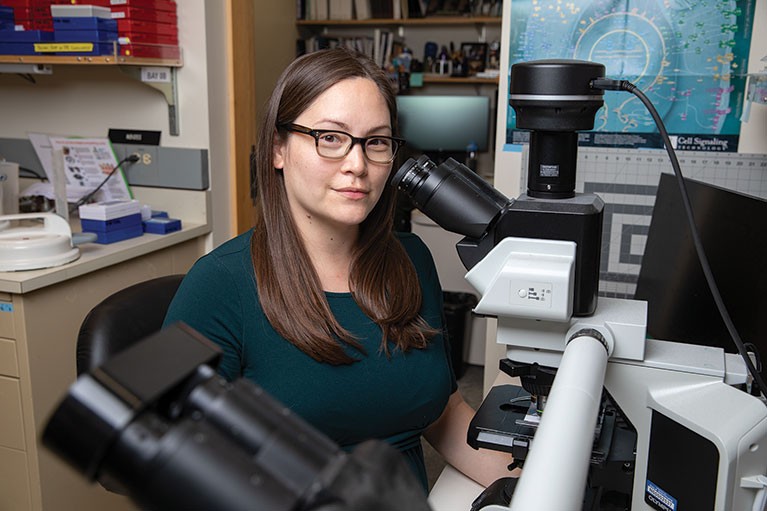
The Prebys Foundation announced Tuesday a $7 million program to address the diversity gap in medical research by funding the work of 14 female scientists at local universities and institutions.
“Eighty percent of postdocs are women, but only 20 percent receive funding to run their own projects,” said Grant Oliphant, CEO of the San Diego-based foundation. “This shows us that the path to leadership in medical research is fraught with barriers.”
“Our program is designed to address that problem by empowering 14 brilliant researchers with the means to pursue cutting-edge research that promises to tackle some of the most challenging diseases facing our world today,” he said.
The program will award a two-year, $500,000 grant to each of the researchers, who Prebys said demonstrate “exceptional promise in areas critical to advancing medical science, including liver, gastric, and pancreatic cancer, Alzheimer’s disease, infectious disease, and mental health. “
Prebys partnered with the Science Philanthropy Alliance to create the grantmaking initiative, which the foundation hopes will set the standard for other organizations across the country seeking to address disparities in the research community.
The recipients of the grants are conducting research at key institutions in San Diego that are at the forefront of diversifying labs and embracing a wider array of scientific questions and methodologies.
“These remarkable individuals, hailing from various countries such as Ukraine, the Philippines, Spain, and Kenya, highlight the diverse range of backgrounds and perspectives they bring to the field of science,” said Elizabeth Weiss of the Science Philanthropy Alliance. “This diversity has the incredible potential to drive scientific breakthroughs that will ultimately improve health outcomes.”
The 14 researchers who will receive the grans are:
Rachel Blaser — Professor of psychology at the University of San Diego whose research could lead to methods for early detection of Alzheimer’s disease.
Dannielle Engle — Assistant professor at the Salk Institute who is working to find a way to easily and quickly diagnose pancreatic cancer.
Stephanie Fraley — Associate professor of bioengineering at UC San Diego who is identifying technologies for infectious disease detection and identification of therapeutic targets for cancer metastasis.
Mia Huang — Association professor of chemistry at Scripps Research whose work focuses on the biological functions of glycans, which effect pregnancy risks.
Xin Jin — Assistant professor of neuroscience at Scripps Research who is seeking to understand the cellular underpinnings of brain development.
Razel Bacuetes Milo — Associate Professor of nursing and health science at the University of San Diego who is a practicing family nurse practitioner studying the relationship between perceived well-being and stress among the Filipino community.
Marygorret Obonyo — Associate Professor at the UC Diego School of Medicine who is studying a pathogen called Helicobacter pylori, which is a cause of gastric cancer.
Angelica Riestra — Assistant professor of biology at San Diego State University who is focusing on pathogens that affect female reproductive health, especially Trichomonas vaginalis, which causes the disease trichomoniasis disproportionately affecting Black women.
Erica Ollmann Saphire — President and CEO of the La Jolla Institute for Immunology who is studying the molecular relationships between pathogens and their hosts and leading efforts to recruit more women of color.
Sonia Sharma — Associate professor at the La Jolla Institute for Immunology who is studying the differences in the immune system between males and females.
Tatyana Sharpee — Professor at the Salk Institute whose potentially groundbreaking interdisciplinary research could dramatically improve our understanding of the brain.
Sujan Shresta — Professor at the La Jolla Institute for Immunology who focuses on protecting the public against viruses such as dengue, Zika, West Nile and Powassan that manipulate human immune cells and have the potential to cause long-term neurological issues.
Lisa Stowers — Professor of neuroscience at Scripps Research who is seeking to develop medications and therapies to treat a wide variety of brain-related disorders, from depression to dementia.
Daniela Valdez-Jasso — Associate professor of bioengineering UC San Diego who studies pulmonary hypertension — high blood pressure of the lungs — which is only diagnosed by observing the damage it has already caused to the heart and whose only “cure” is a lung transplant.
The Prebys Foundation, created by real estate entrepreneur Conrad Prebys, is the largest independent private foundation in San Diego County
